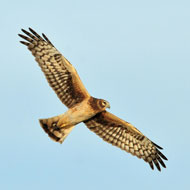Conservationists hail arrival of hen harrier chicks

The Forest of Bowland used to be known as England’s last remaining stronghold for breeding hen harriers.
Four nests of rare hen harrier chicks have hatched for the second year running in the Forest of Bowland AONB, according to conservationists.
The nests were discovered in the United Utilities Bowland Estate in early Spring and RSPB staff and volunteers have been monitoring them ever since.
In 2018, there were only nine successful hen harrier nests in the whole of the UK. A third of these were on the Bowland Estate, on which land is managed under low-intensity farming and shooting models.
The Forest of Bowland used to be known as England’s last remaining stronghold for breeding hen harriers. Last year, however, was the first time the birds had nested since 2015.
Experts say that a second successful breeding season ‘indicates its re-establishment as a hen harrier stronghold’.
“It’s great news that hen harriers are breeding on the Bowland Estate for the second consecutive year,” commented James Bray, the RSPB’s Bowland Project Officer. “We were delighted last season when birds successfully nested after two disappointing years but we were fearful it might have been a one-off as the population remains perilously low.
“This gives us some hope for the future. Last year, we saw 13 chicks fledge at Bowland; perhaps this year we might have even more.”
Elliott Lorimer from the Forest of Bowland AONB Partnership added: “We are absolutely delighted that there are hen harrier nests again this year on the UU Bowland Estate and have our fingers crossed for the newly hatched chicks.”
The RSPB is now working in close partnership with United Utilities and the Forest of Bowland AONB to give hen harriers the best chance to breed and raise their chicks.



 The Animal and Plant Health Agency (APHA) has updated its online reporting service for dead wild birds.
The Animal and Plant Health Agency (APHA) has updated its online reporting service for dead wild birds.